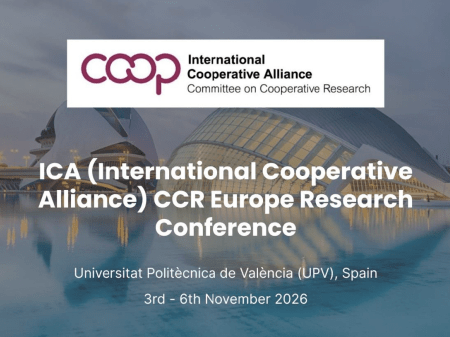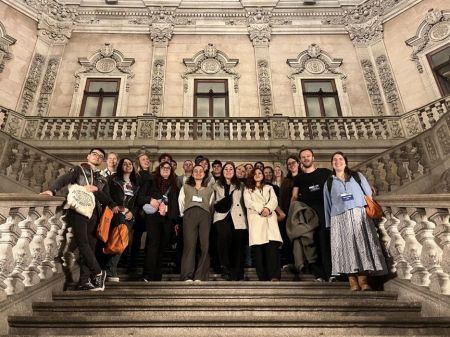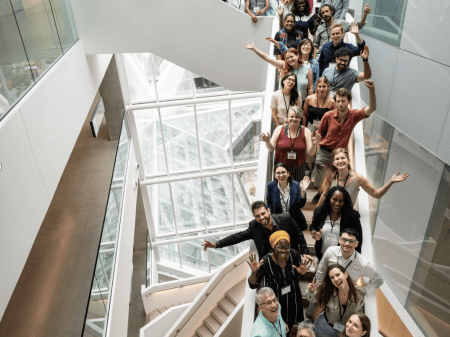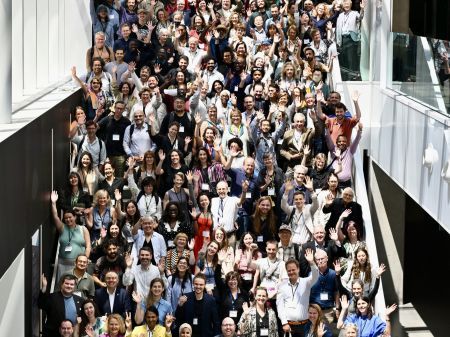The International Cooperative Alliance (ICA), through…
[Deadline extended 15th April] Call for abstracts and panel proposals - ICA Cooperative Research Conference "Deepening Our Cooperative Identity" 28-30 November 2021, Seoul, Republic of Korea
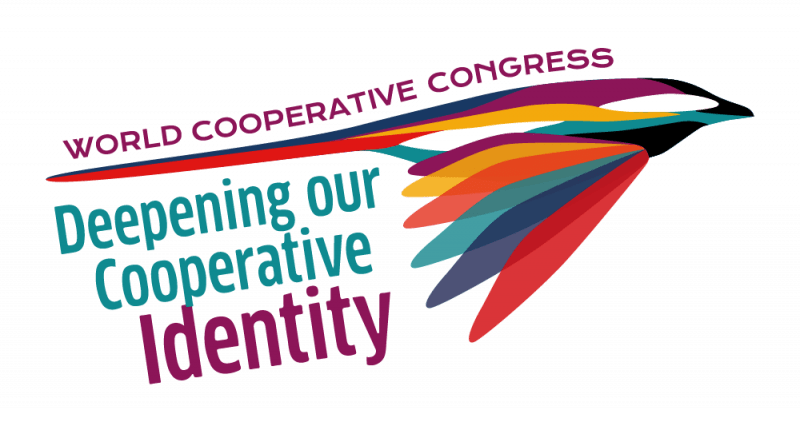
Change of Dates and Reopening Call for Abstracts and Panel Proposals
Important Note
Due to the ongoing COVID-19 pandemic, the 33rd World Cooperative Congress and related events are now rescheduled to take place from 28 November to 3 December 2021.
The preparatory Cooperative Research Conference and the 3rd International Forum on Cooperative Law will take place on 28-30 and 29-30 November 2021, respectively and will be precursors for thematic debates based on scientific and analytical contributions aimed to build content for discussions during the Congress.
The call for abstracts and the call for panel proposals are open again for submissions until April 15, 2021!
We invite you to read this detailed call extension, and request you to direct your questions and concerns regarding the ICA Cooperative Research Conference to research.congress@icaworldcoopcongress.coop and those regarding the 3rd International Forum on Cooperative Law to lawforum@icaworldcoopcongress.coop
Context: the 33rd ICA World Cooperative Congress
2020 marked the 125th anniversary of the International Cooperative Alliance (ICA) and the 25th anniversary of the ICA Statement on the Cooperative Identity. It was also a year spent amid a pandemic that continues in 2021. As a result, the 33rd World Cooperative Congress has been rescheduled to be organized in December 2021 in Seoul, Republic of Korea. The decision to further defer the Congress was taken by the ICA Board towards the end of 2020 considering the most recent situation of the spread of the COVID-19 virus as well as the progress being made by the scientific and medical communities to protect human life.
The Congress offers a unique opportunity to celebrate and deepen the understanding of the cooperative identity and the profound social and economic impact of cooperatives worldwide with discussions on questions such as:
- How do the cooperatives transform societies?
- How does the cooperative way of doing business create an innovative pathway to a sustainable future?
- How cooperatives show resilience and innovation, and help communities, in the wake of crises such as the COVID-19 pandemic?
The event will explore how the cooperative identity addresses current global issues like climate action, sustainable development, conflicts and violence, income and wealth inequality, gender equality and the future of work, that demand a resolute response. The competitive advantage of the cooperative identity — business performance, market share, best governance and management practices, and the unique nature of cooperative capital, will also be explored.
|
What is a World Cooperative Congress? World Cooperative Congresses, organized by the International Cooperative Alliance (ICA), convene only on very special occasions: the creation of the ICA (1st Congress, 1895); the approval of the Statement on the Cooperative Identity (31st Congress, 1995); or the UN International Year of Cooperatives (32nd Congress, 2012). These are gatherings of cooperators at large including representatives of ICA member organizations. The 33rd World Cooperative Congress, initially foreseen for December 2020 and now postponed by a year to December 2021, in Seoul, will be only the second Congress to be held outside Europe and is an opportunity to reaffirm the universal value and recognition of the cooperative identity. Read more about the 33rd World Cooperative Congress at |
The Research Conference
The ICA Cooperative Research Conference will be organized on 28-30 November 2021 in Seoul as a pre-Congress event. The Conference will be the precursor for debates on key-themes and sub-themes of the World Cooperative Congress, building content for discussions based on scientific and analytical contributions.
Abstracts and proposals of panel sessions
|
Note to researchers having who have already presented an abstract during the original call for abstracts in 2020 We thank researchers who had submitted their abstracts and proposals for panels for the research conference, in 2020, with whom we will continue to work through 2021. We ask them to check the information regarding the conference fees and modalities of participation below. This information is also available on the ICA website HERE and on the Congress website HERE. |
The Cooperative Research Conference will explore and address specific themes intrinsically linked to the overarching theme of the Congress: “Deepening Our Cooperative Identity”.
The ICA invites cooperative researchers, experts and practitioners to submit individual abstracts (750 words maximum) or proposals of panel sessions (including the participants' names and affiliations) on the themes defined in the Concept note of the 33rd Congress (see annex in the attached document) and proposed under one of the four specific Thematic Lines outlined in the Thematic Lines section below.
Please use submission forms for abstracts and panel-proposals, downloadable HERE. The submission should include:
- Title, author and affiliation
- The Theme of the submission (see Thematic Lines below). A sub-theme may also be indicated.
- The core idea/ argument/ message as a contribution to the discussion of the Cooperative Identity as well as 3 to 5 keywords
- An explanation on why the submission contributes to the advancement of knowledge about the Cooperative identity (as relevant)
Evaluation and selection will be made on the basis of the potential of the proposed communications and panel sessions to address critical issues in mobilizing relevant and robust arguments based on both theoretical, analytical, conceptual and empirical bases.
Young Scholars (students, or scholars within 2 years of graduation) are particularly encouraged to submit proposals.
The authors of the selected abstracts will be invited to develop them into full papers (5000-7000 words) and if specifically indicated, extended abstracts (2000-3000 words). Selected authors will interact with the Scientific Committee of the research conference in order to elaborate their papers in line with the Congress program.
Abstracts for papers and proposals for panels under this new and re-opened call must be submitted by April 5, 2021. Final papers to be submitted by July 31, 2021.
Thematic Lines
1. The Cooperative Identity
What are the unique opportunities that the Cooperative Identity presents for membership growth, expanded market share and significant social impact?
- a. Governance and member participation
- b. The Cooperative brand recognition
- c. Education about cooperative identity
- d. Cooperatives and cooperative identity as intangible cultural heritage
- e. Cooperatives and the Social Solidarity Economy
- f. Diversity, equity and inclusion
- g. Other topics clearly related to this theme may also be considered
2. Cooperative Innovation and Entrepreneurship
The cooperative identity as a foundation for innovation and a unique business opportunity.
- a. New economic paradigms, digital transformation, and new business models
- b. Ethical value chain management
- c. Building strong cooperative entrepreneurial networks
- d. Cooperative capital: meeting future capital needs
- e. Other topics clearly related to this theme may also be considered
3. Cooperative Global Commitment
The present and future roles of cooperatives in affecting positive change to global challenges: climate crisis, conflict, inequality.
- a. Global crises, such as health crises including COVID-19, migrations etc.
- b. Climate change and environmental protection
- c. Positive peace, natural disaster recovery and socio-economic cohesion
- d. Global cooperative development
- e. Other topics clearly related to this theme may also be considered
4. Cooperative identity and the SDGs
Cooperatives as promoters of the SDGs and the role of the cooperative identity
- a. Work and its future
- b. Health and social services
- c. Food security
- d. Energy and housing
- e. Other topics clearly related to this theme may also be considered
Fees and other Modalities of Participation
The events will be organized in a hybrid format with participants to be given the option of joining virtually through the internet, or physically (presential) in Seoul. The following fee structure will be applicable for participants and will cover access to all research-based events.
|
Presential (physical) Participation
Virtual Participation
Notes
|
Timelines
Submissions of Abstracts and/or Panels by 15 April 2021
Notification to selected authors by 5 May 2021
Submissions of final papers by 31 July 2021
Publication of abstracts and/or papers
All abstracts will be translated into four languages (EN, FR, ES, KR) and integrated into conference proceedings. All papers will be uploaded on the Congress website and app.
Post-Conference activity (until 31 May 2021)
After the Congress, authors may review their papers and submit them to the ICA. The submitted papers, if accepted, will be used to publish the ICA Cooperative Research Conference proceedings, a dedicated edition of the Review of International Cooperation and other publications (TBD), including in Spanish, French and Korean, subject to the authors’ approval.
Language
Abstracts should be submitted in English, French, Spanish or Korean. Full papers should also be written in one of these four languages.
Proposal Submission
In using provided forms, please submit your abstracts or panel session proposal to research.congress@icaworldcoopcongress.coop indicating in the subject line: “LAST NAME-World Coop Congress 125 Years ICA-Theme #” for communications or “LAST NAME-World Coop Congress 125 Years ICA Panel-Theme #” for panel proposals.
If you are a Young Scholar (student, or within 2 years of graduation) please add:
“LAST NAME - YS-World Coop Congress 125 Years ICA– Theme #”
More information
For more information, please contact us at research.congress@icaworldcoopcongress.coop
Scientific Committee
A scientific committee will supervise the process of communication selection and elaboration of papers. The committee has two co-Chairs and is composed of researchers proposed by
- The ICA Committee on Cooperative Research
- The Korea Society of Cooperative Studies
There will be four linguistic streams in the evaluation process, for English, Spanish, French and Korean.
Co-Chairs:
- Sonja Novkovic, Sobey School of Business, Saint Mary's University, Canada
- Jung-Joo Kim, KON-KUK University, Republic of Korea
Members:
- Esther Gicheru, The Co-operative University of Kenya, Kenya
- Mirta Vuotto, University of Buenos Aires, Argentina
- Claudia Sanchez Bajo, University of Buenos Aires, Argentina
- Davi Moura Costa, University of Sao Paulo, Brazil
- Jessica Gordon Nembhard, City University of New York, USA
- Akira Kurimoto, Hosei University, Japan
- Morris Altman, University of Dundee School of Business, UK
- T. Paranjothi, Agricultural Cooperative Training Institute, India
- Yashavantha Dongre, University of Mysore, India
- Cynthia Giagnocavo, University of Almería, Spain
- Constantine Iliopoulos, Agricultural Economics Research Institute, Greece
- Paola Raffaelli, Copenhagen Business School, Denmark
- Claude-André Guillotte, University of Sherbrooke, Canada
- Maryline Filippi, University of Bordeaux, France
- Lou Hammond Ketilson, University of Saskatchewan, Canada
- Roger Spear, Open University, UK
- Seungkwon Jang, Sungkonghoe University, Republic of Korea
- Chung-Ok Koo, Seoul Women’s University, Republic of Korea
- Hyungmi Kim, Sangji University, Republic of Korea
- Jaeil Song, Myongji University, Republic of Korea
- Sang-Youn Lee, Sungkonghoe University, Republic of Korea
- Seongjae Park, GSnJ Institute, Republic of Korea

